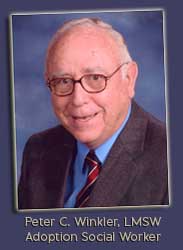 Adoption Expert and Adoption Social Worker, Peter Winkler, LMSW explores Claudia Jewett’s work as a therapist and author in order to investigate good practice with adoptive children. Mr. Winkler writes regularly for allexperts.com on the subject of adoption and here on the Adoption STAR Blog.
Adoption Expert and Adoption Social Worker, Peter Winkler, LMSW explores Claudia Jewett’s work as a therapist and author in order to investigate good practice with adoptive children. Mr. Winkler writes regularly for allexperts.com on the subject of adoption and here on the Adoption STAR Blog.
Over the years that I have worked in the field of adoption, I have had the pleasure of meeting and listening to, a number of individuals who have written about working with adopted children and their families. I would like to write here about Claudia Jewett, the author of a number of articles and books on adopting children. Her most well-known books, Adopting the Older Child and Helping Children Cope with Separation and Loss, continue to be classics in the field some three decades following their publications. I recently came across a book named Working With Older Adoptees: A Sourcebook of Innovative Models, in which Claudia was interviewed regarding the approaches that she takes when counseling an older adopted child and his or her family.
Claudia indicates that in most cases she tries to work with the entire adoptive family and that a primary reason for this is to get the parents, the child and even other siblings in the home to increase their understanding of their mutual feelings. She points out that a group meeting of parents, adopted child and other siblings will prevent the adopted child from simply denying that there is any problem, if seen alone. Moreover, such meetings reduce the issues that arise concerning privacy. When meetings are held on a more individual basis, e.g. with the adopted child or with the adoptive parents, Claudia lets the parties know that she will not share information that has been given in an individual session (with the exception of a child revealing plans for suicide or violence toward others). During the sessions, Claudia helps the child and family to revisit events of the past and asks the child if the story could have a different ending, what would it be? This process helps empower the child and also to provide valuable insight to the parents who may not have been present when these events occurred.
She also notes that a common theme during her sessions is controlling anger. Some families come to her because they are at a point where someone is going to leave the family or hurt somebody. The family has to learn “how to live together in a neutral enough environment that healing can begin.” Part of her role is to help the family members to express their feelings in ways that are not destructive to themselves or to other members of the family. She also indicates that in some cases the adoptive parent never learned to deal with anger in their own family since all of the members withdrew when anyone became angry. Her role is to help both the child and family to recognize that you can become angry about something, but still love the other person.
In working with the family and the child Claudia tries to model behavior that the parents might later imitate. Her ultimate goal is for the parents to become better therapists for the child than she can be.
Obviously, these brief comments regarding Claudia Jewett’s writings cannot do justice to her abilities both as an author and therapist. It would be my hope that those adoptive parents who are reading this blog will go on to read some of her work. Moreover, when problems do arise in the adoptive family, parents will recognize that it is a sign of strength, rather than weakness, to sight the help of a therapist who has experience with adoptive families.
Adoptive parents need to recognize that even if their child was adopted at a very young age, they still carry the burdens of separation and loss.
Read More from Peter Winkler:
DOLLARS AND “SENSE” IN ADOPTION,
Key Points in Contemporary Adoption Practices,Adoption Expert Peter Winkler Adds his Expertise to the Adoption STAR Blog
Read More on What is Happening at Adoption STAR: Our Calendar of Events for 2013
